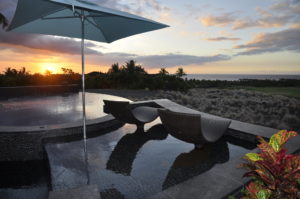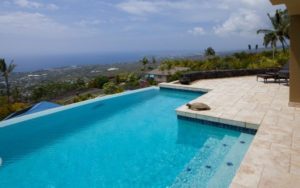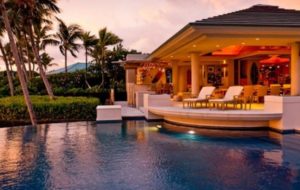 Owning a swimming pool in Hawaii can be an expensive endeavor. If you’re thinking about taking the plunge into pool ownership — or if you already own a pool that could be better maintained or run more cost effectively — there are many factors to consider before you dive in.
Owning a swimming pool in Hawaii can be an expensive endeavor. If you’re thinking about taking the plunge into pool ownership — or if you already own a pool that could be better maintained or run more cost effectively — there are many factors to consider before you dive in.
Winter, spring, summer or fall, swimming pools in Hawaii get used all year round. Monthly expenses include chemicals, pool-cleaning services, equipment and utilities. Due to the high cost of living, all of your pool expenses will be higher here than most anywhere else in the country.
One of the biggest considerations to pool ownership is heating. Even on the hottest day, most pools in Hawaii need some kind of heating system. Although expensive to install, solar heating is one of the best ways to heat a pool. Once installed, the system runs itself without incurring any energy bills. The least expensive heating option is a solar pool cover. Made of vinyl, pool cover sheets float on the surface of the water. In addition to retaining heat, a pool cover can increase water temperature by up to 11 degrees.
 In Hawaii, propane is the norm for heating pools. Propane is more efficient than electricity because gas tends to heat water more quickly. The color of your pool can also make a difference in the water temperature. Black, grey and blue surfaces heat the water up an average of six degrees. Although a black pool can be aesthetically pleasing and resemble a natural pond, it’s a lot harder to clean because the debris isn’t as visible.
In Hawaii, propane is the norm for heating pools. Propane is more efficient than electricity because gas tends to heat water more quickly. The color of your pool can also make a difference in the water temperature. Black, grey and blue surfaces heat the water up an average of six degrees. Although a black pool can be aesthetically pleasing and resemble a natural pond, it’s a lot harder to clean because the debris isn’t as visible.
When designing your pool, be sure to avoid costly mistakes that you might regret later. One of the biggest mistakes is to place trees too close to your pool. The wrong kind of tree can shed debris so badly that your pool will always be messy and the chemical balance will always be affected. Palm trees near a pool can be especially problematic. The shallow roots of the palm tree will travel under the deck searching for water, which could result in a cracked deck. Homeowners should be aware that infinity-edge pools require a lot more water due to excessive evaporation. Lava-rock water features can shed bits of debris into the pool, as well as hold bacteria and promote silica buildup.
Some pool owners have discovered the benefits of salt to make chlorine. A chlorinator unit can be pricey, but once installed, it is relatively easy to maintain. The benefits include less chlorine odor and reduced stinging of the eyes. You don’t have to use chlorine tablets either.
 When it comes to equipment, don’t skimp. A cheap pump, filter or motor can bring you worlds of hurt. Don’t try to save money on electricity by reducing the recommend amount of time your pump should operate each day. You might end up with a green pool, or one riddled with algae. Don’t let your dog swim in the pool, either. Dog hair reeks havoc on the filter and pump.
When it comes to equipment, don’t skimp. A cheap pump, filter or motor can bring you worlds of hurt. Don’t try to save money on electricity by reducing the recommend amount of time your pump should operate each day. You might end up with a green pool, or one riddled with algae. Don’t let your dog swim in the pool, either. Dog hair reeks havoc on the filter and pump.
An automatic pool sweep is always a good investment. It can help maintain the pool on a daily basis. A pool sweep, however, is not a substitute for weekly cleaning, which can prevent problems like yellow algae. A pool-cleaning service is pretty much a must in Hawaii. Unless, of course, you know the ins and outs of how to keep your pool maintained.